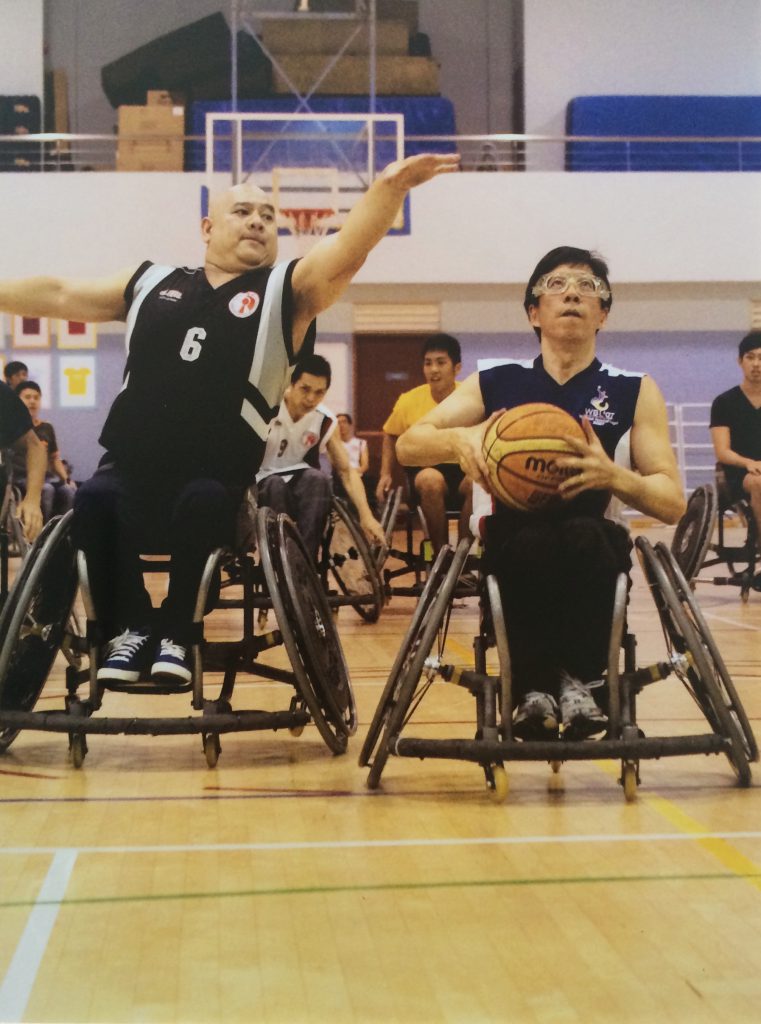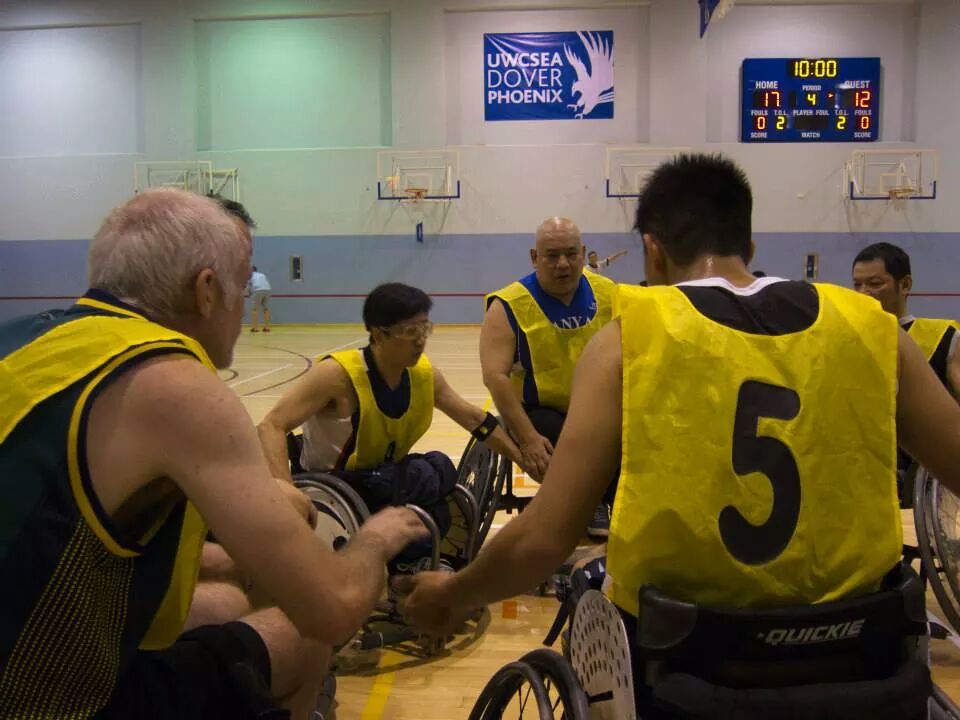Living life to the fullest
Edwin Khoo has faced challenges after challenges, and each time, he took the lessons in his stride.
BY: Eleanor Yap
Things were tough for Edwin Khoo, 61, when he was growing up. The environment and people around him brought him down, but he never let it get the better of him as if he did, he wouldn’t be where he is today.
Edwin was part of a family of nine. His father was a fishmonger and his mother a housewife, and he shared his family was poor. When he was two, he was stricken by the polio virus, which left both of his lower limbs weak and resigned to crutches. “My mother told me that it was retribution that caused her to bear a child with a disability and that I should be thankful to be alive and not ask for too much or ask for what able-bodies enjoy,” he said. Explaining further, “They were Taoists and through their beliefs, they felt that my previous life or their previous lives were responsible for what I am today.
“Even today, I don’t blame them for thinking this way as it is their beliefs. I thought it was meant as a defeatist statement to put me down in case I had any wild dreams. In other words, resign to my fate.”
The learning lessons
He never thought that things would get even tougher for him. That same year he was stricken with the virus, one of his younger brothers died from a boiling accident in the family kitchen. The children’s welfare department wanted to charge his mother with neglect, but they felt that if she went to jail, who would then take care of Edwin and his siblings? So, they decided to instead put him in the Red Cross Home for Crippled Children in 1958 at the age of two.
During his formative years at the Home, he learned much about survival. “It gave me a lot of opportunities to interact with people. For instance, there were older and younger boys, and I had to survive and interact with them. I learned how to align yourself with the older boys to get protection. When you don’t have parents near you, you learn it the hard way by yourself and it makes you who you are.”
But within the darkness, there came some light. Besides interacting with his peers, he also got a chance to interact with British expatriates, as the Home was located near the British Air Force base (that time was during the British rule). One time, Edwin shared that when he was around four or five years old, a British couple came to the Home and took him and another child to their home for a sleepover. “I can’t remember the number of days I was there but I was at a children’s home, coming into a family home. Even though I was not their children, they taught me an important lesson about acceptance, opening one’s heart and home to strangers. This charitable act of kindness made an imprint in my heart. Until now, I am into giving – opposite of receiving – anything such as time, effort, money, etc.”
When Edwin was seven or eight years old, he was sent back to his parents’ home. He revealed, “In retrospect, I missed parental and motherly love.” He said that it was tough readjusting to home life with his family (even though his father and siblings did visit him while he was in the Home), and there were many trying moments when he felt he wanted to return to “my own home – the children’s home”. “I felt rejection from my mother especially and I couldn’t detect the love within the family,” said Edwin.
He shared one such disconnect. When he came home, he brought his personal items from the Home such as his comic books and toys. On one occasion, his mother took them away from him and gave them to his younger brother. “I didn’t mind sharing them but my mother would cane me when my younger brother and I would fight over my toys. There was no such thing as personal things but at the children’s home, we had our own bed and a locker with our own stuff. My brother was also my mother’s favourite. I was indignant about the whole thing.”
Today, it still pains him about not having established a closer relationship with his mother. He said: “Though my mother passed away in 2008, our relationship was always on the surface, not in-depth. I couldn’t bond with her.” He also regrets the one time before her passing when she was in the hospital and he brought his younger brother, the “favourite son”, to visit her.
Edwin said that his brother brought bak chang (Chinese rice dumpling) and he questioned him on why he brought it as the doctor said only hospital food as she was diabetic, and no outside food. He answered that she liked to eat it. “I kept telling him that he shouldn’t have brought it. When we visited her, he didn’t take it out. Two days later, she passed away out of the blue. I thought back then that if I had known, I would have let her eat it. It was very sad, I would have let her eat anything. Sometimes you make decisions like that.”
More challenges
The challenges in his life didn’t just lie in the strains he had with his mother, he also had challenges surrounding his disability. He shared the time when he was around 14 or 15 years old and walked 1km on crutches from his home to his godmother’s home. He was often in high spirits as he enjoyed visiting her and her family. When he reached one time, one of his god brothers made a remark to him in Mandarin – “Every time I see you, you look cheerful and positive”. “At that time, that remark struck me as I immediately compared myself to him. He was from a rich family, had everything he wanted and should be carefree. In other words, even though I was sweating profusely from the walk, I wasn’t perturbed nor bothered about my disability and was really quite cheerful. It sort of confused me then. Made me wonder if I was being ignorant or insensible to my sorry condition?”
He credits his positive attitude to his upbringing in the children’s home. “I think the Home taught me to look forward rather than backward and to focus on my abilities rather than what I didn’t have.” This spurred him on to live the life he is proud of today. At the age of 24, he was introduced to wheelchair racing. “It is a real adrenalin rush. My fellow disabled friends were all racers. If you go full speed on a wheelchair, you can almost go as fast as an able-bodied runner!” He even competed on the international arena and won medals.
However, in 1982 during a sports meet in Hong Kong, he not only experienced wheelchair basketball for the first time and got hooked, but found yet another distraction – he met his future wife. “Wheelchair basketball is a team sport, very much different from wheelchair racing. Not only do your teammates rely on you, but the game involves speed as well as skill.” He also competed, most recently two years ago at the ASEAN Paralympic Games in Singapore before he decided it was time to retire. Asked about his reasons for retiring, he admitted: “Wheelchair basketball is a physical and dynamic game more suited for the young; I haven’t seen a 60-year-old playing. I simply couldn’t catch up with them so I called it a day.” But even though he stopped competing, he makes it a point to still go down for training twice a week for two-hours stretch and play not just with those who are disabled but also able-bodied kids who are around the same age as his three children.
“I want to keep the game alive so that is why I keep playing. This is my reason for giving back. I am the oldest in the team, was the captain and now the glue-guy to keep the peace. Basketball is a contact game. When you have 10 players whose blood are fired up, all hell breaks loose. Sometimes the game heats up and things get out of control. To me, this is healthy as it allows individual players to vent their frustration. Some of the aged 30+ fellow disabled say to me that they need extra effort to catch up with me!” Edwin laughed.
Asked if he could change one thing in his life besides having a better relationship with his mother, he said it would be nothing, not even contracting the virus. Instead, he counts the many blessings in his life including having a stable job as a procurement manager in an engineering firm, a marriage of 27 years (and counting), and his children (one already married). “I have seen what people have, but are still disappointed and don’t have but are contented. I am thankful for what I have and what I am, and what I am not and what I don’t have.”
Though he hasn’t forgotten what his mother once said that he should be thankful to be alive and not ask for too much or ask for what able-bodies enjoy, he uses it to motivate himself. “Goals are essential to keep us going, but I also cannot allow myself to be burdened nor be blinded by it. I set standards that are reasonable and would thankfully accept any results that came my way. If you can’t achieve lofty goals, you can never be at peace. So, I am extremely humbled by what I have achieved so far and feel blessed for living a full life.”



It is very inspiring to read of how Edwin Khoo overcame the major challenges that confronted him & he moved on with his life. A very moving story to share.
Thanks, Hai Sin for your comments. I will let Edwin know this.